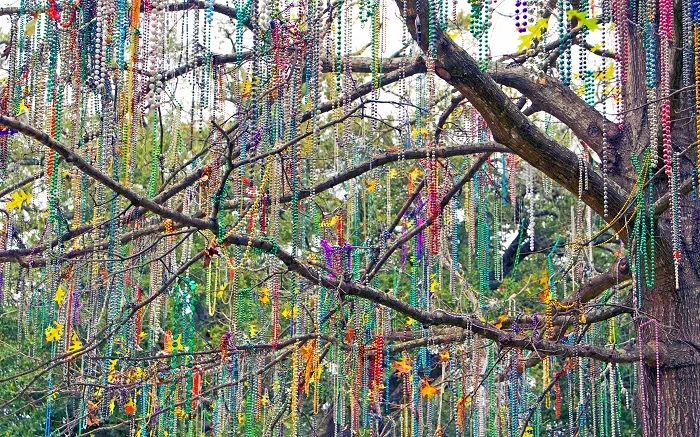
Small beads, big impact: The environmental toll of Mardi Gras
Mardi Gras has arrived. If you're attending, there are ways you can lessen your environmental impact.
New Orleans' Mardi Gras festival has arrived.
The annual event is a boon to the city, injecting hundreds of millions of dollars into the local economy.
But all the costumes, single-use containers, and plastic beads generate a staggering amount of trash.
In 2018, clean-up crews pulled more than 46 tons - or 93,000 pounds - of Carnival beads from city drains post-fest, accounting for about 2 per cent of the 7.2 million pounds of trash retrieved from clogged catch basins along the main parade route.
Jammed drains aren't just problematic from an environmental perspective: This can also elevate the risk of flooding in an area that's already susceptible to storm surge.
Beads that aren't tossed into drains can end up in trees or in the grass, where they could become a choking hazard to wildlife.
REDUCING THE IMPACT OF MARDI GRAS
There are a few steps festival-goers can take to reduce their footprint, according to the University of Louisiana at Lafayette Office of Sustainability.
Suggestions include reducing the number of disposable items bought and used, bringing re-usable cups or bottles to the celebration, and using recycled items to make a costume rather than buying new.
Beads don't have to be purchased new. Local organizations -- like ArcGNO - sort and re-sell recycled Mardi Gras throws. Attendees can drop their beads off after the festival at one of several donation bins set up throughout the festival.

A decorated tree in the Garden District in New Orleans, Louisiana taken on February 9, 2012. Courtesy: Getty Images.
BIODEGRADABLE BEADS
A New Orleans company called BioBeads LLC is in the process of manufacturing biodegradable and recyclable festival throws made from non-toxic materials.
They're expected to hit the market sometime in 2021. In a press release, the company says it plans to have the beads created locally to further reduce their carbon footprint.
5 OF THE EASIEST WAYS TO REDUCE YOUR PLASTIC USE IMMEDIATELY:
THE PLASTIC PROBLEM
Re-thinking Mardi Gras beads are indicative of a larger, global trend to reduce the use of unnecessary, novelty plastics.
In recent years several studies have signalled an urgent need to curb our plastic addiction, with an estimated 1 billion tonnes of plastic discarded since the 1950s. Research suggests it will take up to 500 years for some forms to biodegrade.
A 2018 report suggests that here in Canada, an estimated 90 per cent of the country's plastic is not properly disposed of and find their way into local waterways and ecosystems, posing a threat to wildlife.












